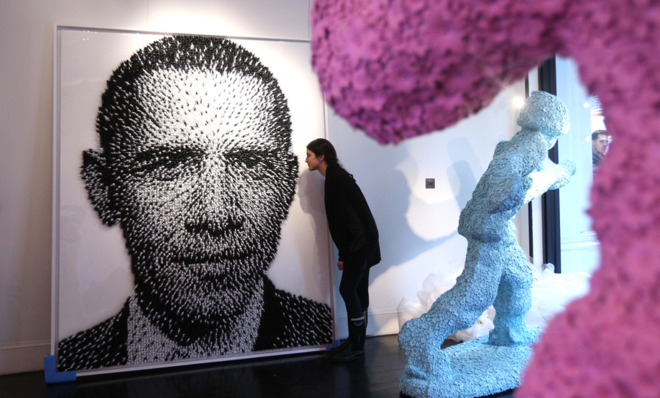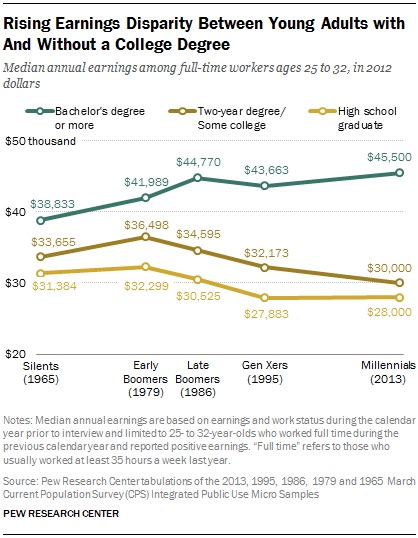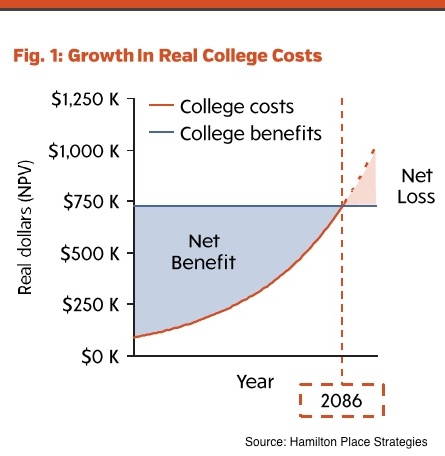Obama is still wrong: Art history degrees are worth a lot
The president apologized for his dig at art history majors, but he's still undervaluing a college degree


A free daily email with the biggest news stories of the day – and the best features from TheWeek.com
You are now subscribed
Your newsletter sign-up was successful
On Jan. 30, President Obama took a gratuitous swipe at art history majors. Speaking at a General Electric plant in Wisconsin, the president was touting vocational education programs as a path to revitalizing America's manufacturing sector. Here's how he sold that:
A lot of young people no longer see the trades and skilled manufacturing as a viable career. But I promise you, folks can make a lot more, potentially, with skilled manufacturing or the trades than they might with an art history degree. Now, nothing wrong with an art history degree — I love art history. So I don't want to get a bunch of emails from everybody. I'm just saying you can make a really good living and have a great career without getting a four-year college education as long as you get the skills and the training that you need. [via Inside Higher Ed]
Needless to say, Obama got a bunch of emails. And while he hedged a bit with "potentially," he's mostly wrong on the merits. So when one art historian, Ann Collins Johns at the University of Texas, corrected him in an email, Obama sent her back a handwritten note apologizing for his "off-the-cuff remarks." Here's his letter, in full:
Ann —
Let me apologize for my off-the-cuff remarks. I was making a point about the jobs market, not the value of art history. As it so happens, art history was one of my favorite subjects in high school, and it has helped me take in a great deal of joy in my life that I might otherwise have missed.
So please pass on my apology for the glib remark to the entire department, and understand that I was trying to encourage young people who may not be predisposed to a four year college experience to be open to technical training that can lead them to an honorable career.
Sincerely,Barack Obama
Obama's point about the value of vocational ed is well taken. "Not everybody can go to college, or should," explains Reuters' Felix Salmon — who was an art history major before becoming a successful and highly regarded economics blogger. "One of the big tasks facing the U.S. economy is the challenge of reducing the cost of not getting a four-year degree."
The Week
Escape your echo chamber. Get the facts behind the news, plus analysis from multiple perspectives.

Sign up for The Week's Free Newsletters
From our morning news briefing to a weekly Good News Newsletter, get the best of The Week delivered directly to your inbox.
From our morning news briefing to a weekly Good News Newsletter, get the best of The Week delivered directly to your inbox.
Indeed, Salmon buys Obama's pitch that a technical degree trumps an art history degree economically.
Given the high cost of a liberal arts education, "you'll be better off, in terms of total lifetime earnings, getting a vocational qualification in the trades than spending four years and a six-figure sum learning about the influence of Piero della Francesca on Jacques-Louis David," Salmon writes. "It's much more sensible to pursue a vocational qualification which takes less time, costs less money, and gives you a much higher chance of getting a good job once you've earned it."
However, the fact of the matter is that an undergraduate education, no matter your major, is still worth more than other types of training. Last week, Pew Research released a study comparing the earnings of four-year college graduates and their peers who got a two-year degree and a high school education.
"On virtually every measure of economic well-being and career attainment — from personal earnings to job satisfaction to the share employed full time — young college graduates are outperforming their peers with less education," the report said. "And when today's young adults are compared with previous generations, the disparity in economic outcomes between college graduates and those with a high school diploma or less formal schooling has never been greater in the modern era." Here's Pew's findings in chart form:
A free daily email with the biggest news stories of the day – and the best features from TheWeek.com

Another new study, from Hamilton Place Strategies, determined that a four-year college degree is still a good investment, and "will remain one of the best available investments" until, probably, 2086:

At least some of that value, HPS says, is the "Sheepskin Effect," or the signal your four-year college diploma sends to employers. Is that true even of art history majors? Well, first of all, there are not many of them: fewer than 0.2 percent of working adults with college degrees, according to Bloomberg's Virginia Postrel.
And according to a 2012 study by The New York Times, those 0.2 percent make up 0.4 percent of the top 1 percent of earners. To put that another way, 5.9 percent of art history and criticism majors are in the wealthiest tax bracket.
That certainly doesn't mean that an art history degree is your ticket to wealth — as Postrel notes, it's probably more the case that people from wealthy families are more likely to major in art history. Obama's jab was still a "cheap shot," she adds, because art history is "an intellectually demanding major, requiring the memorization and mastery of a large body of visual material, a facility for foreign languages, and the ability to write clearly and persuasively." She concludes:
If the president had been serious about his message, he would have compared learning a skilled trade to majors that are actually popular, such as communications and psychology. It would have been much braver and more serious to take on the less-rigorous majors that attract lots of students. But it wouldn't have gotten a laugh. [Bloomberg]
Individual cases will vary, and hopefully there will be plenty of jobs for skilled workers in all fields. But if you were betting on income alone right now, a liberal arts education — yes, even with a focus on art history — is still the safer wager.
Peter has worked as a news and culture writer and editor at The Week since the site's launch in 2008. He covers politics, world affairs, religion and cultural currents. His journalism career began as a copy editor at a financial newswire and has included editorial positions at The New York Times Magazine, Facts on File, and Oregon State University.
-
 6 of the world’s most accessible destinations
6 of the world’s most accessible destinationsThe Week Recommends Experience all of Berlin, Singapore and Sydney
-
 How the FCC’s ‘equal time’ rule works
How the FCC’s ‘equal time’ rule worksIn the Spotlight The law is at the heart of the Colbert-CBS conflict
-
 What is the endgame in the DHS shutdown?
What is the endgame in the DHS shutdown?Today’s Big Question Democrats want to rein in ICE’s immigration crackdown
